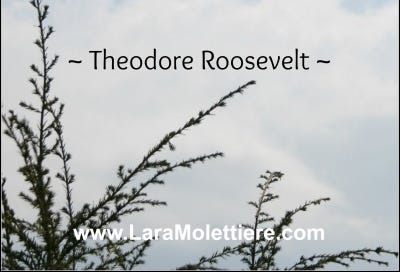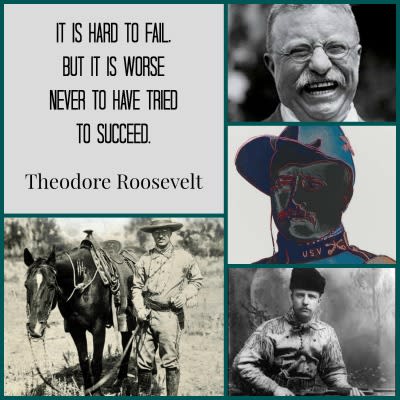Theodore "T.R." Roosevelt, Jr.
Theodore Roosevelt was born October 27th, 1858 and died January 6th, 1919. He is an inspirational figure to study, and the namesake of our firstborn. If you have charge of a young person’s education it is time well spent to learn more about his thoughts, reading habits, and how he embodied his spoken values in his actions.
I am grateful to be of service and bring you quality homeschool and homemaking content. I receive compensation through subscribers, curriculum sales, and affiliate links. As an Amazon Associate I earn from qualifying purchases.
Here are a few fascinating facts about "Teddy" Roosevelt.
Theodore Roosevelt was homeschooled. :)
As a child, Theodore suffered very severe night-time asthma attacks the doctors were unable to cure, but he remained active nonetheless.
He had a lifelong interest in zoology and conservation that is said to have begun around age seven when he saw a dead seal at market and took home the seal's head to begin his own "Natural History" museum.
In his late teens, he found physical exertion to help fight against his asthma, and so began his lifelong pursuit of vigorous activity and high standards for himself and his physical nature.
In 1876, Theodore entered Harvard College with the advice from his father to "Take care of your morals first, your health next, and finally your studies".
Just after college, Roosevelt published his first book, The Naval War of 1812, establishing himself as a historian.
During his tenure in the Dakotas as a deputy sheriff, Roosevelt pursued three outlaws who had stolen his riverboat and escaped north up the Little Missouri. He captured them but decided against a vigilante hanging. He assumed guard over the thieves for forty hours without sleep, while reading Leo Tolstoy to keep himself awake.
Theodore Roosevelt formed the First US Volunteer Calvary Regiment during the war with Cuba, the regiment became known as the Rough Riders. (We have an ancestor that was part of that regiment!)
Theodore Roosevelt openly despised being called "Teddy".
Roosevelt was known to read at least one (often before breakfast during his presidency) and up to several books a day, often in multiple languages. He is considered one of the most well-read presidents, alongside Thomas Jefferson.
In 1986, American artist Andy Warhol created a piece featuring Theodore Roosevelt in his Rough Riders uniform from a photograph from 1898.
Theodore Roosevelt made famous the phrase "Walk softly and carry a big stick".
Our Favorite Books By and About Teddy Roosevelt
Mornings on Horseback: The Story of an Extraordinary Family, a Vanished Way of Life and the Unique Child Who Became Theodore Roosevelt by David McCullough
The Rise of Theodore Roosevelt by Edmund Morris
The Rough Riders by Theodore Roosevelt
The Autobiography of Theodore Roosevelt by Theodore Roosevelt
Carry a Big Stick: The Uncommon Heroism of Theodore Roosevelt by George Grant
The Old Lion: A Novel of Theodore Roosevelt by Jeff Shaara
The Bully Pulpit: Theodore Roosevelt and the Golden Age of Journalism by Dorris Goodwin
The Legend of the Teddy Bear by Frank Murphy
Theodore Roosevelt’s Thoughts on Reading (quotes)
“Books are all very well in their way, and we love them at Sagamore Hill; but children are better than books.”
“Personally, the books by which I have profited infinitely more than by any others have been those in which profit was a by-product of the pleasure; that is, I read them because I enjoyed them, because I liked reading them, and the profit came in as part of the enjoyment.”
"Now and then I am asked as to "what books a statesman should read," and my answer is, poetry and novels—including short stories under the head of novels. I don't mean that he should read only novels and modern poetry. If he cannot also enjoy the Hebrew prophets and the Greek dramatists, he should be sorry. He ought to read interesting books on history and government, and books of science and philosophy; and really good books on these subjects are as enthralling as any fiction ever written in prose or verse. Gibbon and Macaulay, Herodotus, Thucydides and Tacitus, the Heimskringla, Froissart, Joinville and Villehardouin, Parkman and Mahan, Mommsen and Ranke—why! there are scores and scores of solid histories, the best in the world, which are as absorbing as the best of all the novels, and of as permanent value. The same thing is true of Darwin and Huxley and Carlyle and Emerson, and parts of Kant, and of volumes like Sutherland's "Growth of the Moral Instinct," or Acton's Essays and Lounsbury's studies—here again I am not trying to class books together, or measure one by another, or enumerate one in a thousand of those worth reading, but just to indicate that any man or woman of some intelligence and some cultivation can in some line or other of serious thought, scientific or historical or philosophical or economic or governmental, find any number of books which are charming to read, and which in addition give that for which his or her soul hungers. I do not for a minute mean that the statesman ought not to read a great many different books of this character, just as every one else should read them. But, in the final event, the statesman, and the publicist, and the reformer, and the agitator for new things, and the upholder of what is good in old things, all need more than anything else to know human nature, to know the needs of the human soul; and they will find this nature and these needs set forth as nowhere else by the great imaginative writers, whether of prose or of poetry."
"Her soul belongs to words and books. Every time she reads she is home"
“The room for choice is so limitless that to my mind it seems absurd to try to make catalogues which shall be supposed to appeal to all the best thinkers. This is why I have no sympathy whatever with writing lists of the One Hundred Best Books, or the Five-Foot Library. It is all right for a man to amuse himself by composing a list of a hundred very good books… But there is no such thing as a hundred books that are best for all men, or for the majority of men, or for one man at all times.”
"I am a part of everything that I have read."






